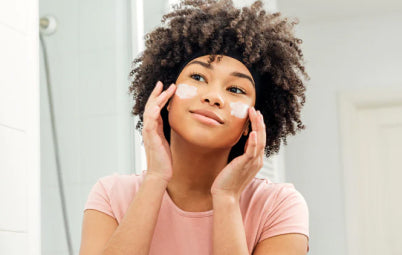Antioxidants are natural vitamins and minerals that protect the body and skin. Of course, we get these from our diet, but did you know they’re also big in the skincare world, too?
Antioxidants like Vitamin C, E and retinol can help our skin with everything from protecting it from UV rays to brightening dark spots and reducing inflammation. But with all the different antioxidants out there, how do you know which one to use? We’ve written this guide to help.
Here’s what we’ll cover about antioxidants:
- What antioxidants do for the skin
- What antioxidants are there
- How antioxidants work
- How to use antioxidants
- Who should (and shouldn’t) use antioxidants
- The side effects of antioxidants
- The top products to try with antioxidants
Here at Face Dr, our team of skin experts are passionate about helping people get healthy, glowing skin. Our experts have decades of experience working with products, ingredients and skincare routines, so know all there is to know about what antioxidants can do, and which ones you should be using.
How do antioxidants work?

First, a quick science lesson. Free radicals are unstable molecules that develop in the body and are linked to illness like cancer and diabetes. We can get them from things like sun exposure, pollution and chemicals. They also break down collagen and elastin in our skin to cause visible damage—like ageing and sun spots—as well as damaging the cell structure under the surface. Antioxidants fight these free radicals and protect the body and skin from harm.
Free radicals aren’t all bad, though; they’re used by our immune system to fight off diseases. It’s when we have too many free radicals in our bodies that it becomes a problem. When we have too many, we experience oxidative stress, which causes inflammation, ageing and damage.
Antioxidants work by neutralising free radicals in the body and can also prevent them from forming in the first place. This protects the skin from their damaging effects.
Our bodies actually create our own antioxidants to fight free radicals, but this declines as we age. So we often can’t keep up with the amount of free radicals that form. To top up our stores, we can get antioxidants from foods like fruits, vegetables, green tea and even dark chocolate and coffee!
While eating a diet rich in antioxidants helps your skin, sometimes our skin needs an extra helping hand fighting free radicals, and applying antioxidants through skincare products is the best way to do it.
In skincare, you can find antioxidants everywhere, from serums and moisturisers to eye creams.
What do antioxidants do for the skin?

Now you know that antioxidants protect us from free radical damage, here’s what that looks like in our skin:
Antioxidants can:
- Brighten hyperpigmentation and prevent new discolouration from forming
- Combat signs of ageing, including wrinkles, sagging and fine lines
- Stimulate collagen production for plumper, firmer skin
- Reduce inflammation and calm irritation
- Boost moisture retention
- Even out your skin tone
- Some antioxidants may even help to prevent skin cancer
What are antioxidants?
While you may sometimes just see “antioxidants” on a skincare product label, it’s much more common to see one type of antioxidant. Here are some of the most common ones:
Vitamin C

You’ve probably heard of vitamin C. Not only is it essential in your diet for boosting your immune system and keeping you healthy, it’s a key skincare ingredient that can help with ageing, hyperpigmentation and dull skin. This antioxidant boosts collagen for firmer and plumper skin and evens out the skin tone, making it look bright and dewy. It also protects the skin from harmful compounds like pollution and UV rays.
Vitamin A (or retinol)

Retinol is derived from vitamin A and is a common antioxidant in anti-ageing products. This antioxidant also promotes collagen for younger-looking skin, and it also smooths fine lines and wrinkles. Retinol stimulates cell renewal which helps the skin heal, making younger, brighter skin cells in the process.
As well as anti-ageing, retinol can also help with acne. The ingredient can unclog pores and decrease sebum production so it helps to clear up your complexion.
Want to find out more about other common skincare ingredients? We’ve covered those, too. For example, find out more about ceramides here.
Vitamin B3 (niacinamide)

You can find vitamin B3, or more often niacinamide, in many skincare products including cleansers, toners, moisturisers and serums. It helps to boost hydration and repair the skin’s natural barrier, which keeps irritants out and moisture in.
Just like other antioxidants, it can also protect your skin from harmful free radicals that cause damage and ageing. Niacinamide works to lighten hyperpigmentation, smooth fine lines and reduce redness and inflammation.
Vitamin E

Vitamin E is another very common antioxidant you may have already come across. It helps the skin heal more effectively and it strengthens the skin’s barrier. For this reason, you’ll often find it in products designed for sensitive or dry skin.
Vitamin E works best when it’s combined with Vitamin C. In fact, you can often find many products that already combine the two.
In the food world, you can find resveratrol in tea, nuts and dark fruits like blueberries and red grapes and even red wine. As well as protecting the skin from free radicals in pollution and UV rays, it brightens the complexion and reduces redness. It’s also antimicrobial and anti-inflammatory. Some studies show it may even protect against cancer.
Green tea

We all know a cup of green tea is good for us, but now the wonder ingredient is making its way into the skincare world. Polyphenols — which can also be found in red wine and chocolate — appear in green tea and can help to improve our skin’s ability to heal. They’re soothing, anti-inflammatory, and even reduce redness and signs of damage, which is great for those with rosacea and acne.
Green tea can also stop collagen from breaking down, a key component in how our skin looks as we age.
How do you use antioxidants?
You’ll most often find antioxidants in serums, moisturisers and eye creams. How you use them will depend on the product, but most can be applied once or twice a day. Though some stronger products may only be used once a week.
Who can use antioxidants?
As there are so many different types of antioxidants out there, most people will be able to find one that suits them. All skin types, even sensitive, can use antioxidants.
Vitamin E and Niacinamide are the gentlest, but even vitamin C and retinol can be used in the right way. Do a patch test to check for irritation, then start using the product slowly, about once or twice a week. Plus, if you have easily irritated skin, opt for a weaker percentage, such as a 10% vitamin C serum instead of a 20% one or a vitamin E moisturiser over a serum, as that’s weaker.
For those with extra sensitive skin, rosacea or who are pregnant, stronger ingredients like retinol may not be suitable. Retinol may also not be suitable for those who spend a lot of time in the sun as it makes the skin more sensitive to UV rays.
It’s also best to speak with a skincare professional who can give you tailored advice. At Face Dr, we offer free skincare consultations where one of our experts can analyse your skin and recommend the best products and antioxidants to help tackle your concerns.
Book your free video consultation with a Skin Expert
Which ingredients should you not use with antioxidants?

There are a few key combinations you should look out for and avoid when using antioxidants.
Vitamin C, for example, needs a specific pH to be effective and certain ingredients, like niacinamide and benzoyl peroxide, change the pH and make it less effective. If you want to use two of these ingredients together, be sure to use them at different times of the day, like as part of your morning and evening routines, or on different days.
As retinol is a harsher ingredient and can be irritating for a lot of people, it’s important to avoid combining it with other potentially irritating ingredients. These include vitamin C, AHAs like glycolic acid and BHAs like salicylic acid.
What are the side effects of antioxidants?
Anything can have side effects, unfortunately, even antioxidants. As there are so many different types, each one has its own risks. Most people won’t experience any side effects at all. For those that do, most of the time it will be a mild reaction that could include:
- Redness
- Irritation
- Itching, burning or stinging
- Dry or flaky patches
Most of the time side effects will go away on their own when you stop or reduce the amount of product you’re using. If you experience more serious side effects, stop using the product immediately and speak to a professional.
Products to try with antioxidants
- ZO Skin Health Exfoliating Cleanser (vitamin E)
- Glytone Age Defying C+ Advanced Antioxidant Serum
- ZO Skin Health 10% Vitamin C Self-Activating (vitamin C)
- SkinCeuticals Resveratrol B E (resveratrol and vitamin E)
- Medik8 C-Tetra Luxe (Vitamin C)
- ZO Skin Health Exfoliation Accelerator (green tea and vitamins A, C and E)
Face Dr top tip: Antioxidants break down and stop being as effective when they’re exposed to too much sunlight, so you should always store these products in a cool, dark place.
Still have questions?

Hopefully, you know now what antioxidants are and the many benefits they can have for your skin. But it can be hard to know which ones you should be using. That’s where speaking with a professional can help.
Here at Face Dr, we offer free online skincare consultations to help you make the best decisions for your skin. In a 30-minute video call, one of our skin experts can analyse your skin, ask about your exact concerns and recommend the very best antioxidants to help.
They’ll recommend the exact products to use and even the perfect routine to use them in. We only ever recommend products we’ve seen real results from, and there’s never any obligation to make a purchase. This way, you can trust you’re getting the best advice and making the best choices to keep your skin healthy and happy.











